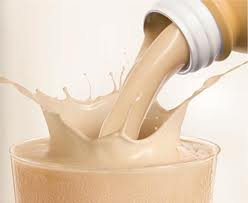How to Survive Your Liquid Diet

WHY A LIQUID DIET?
Bariatric clinics use differing protocols for their patients’ pre-op and post-op diets. Why? When you finish explaining that, perhaps you could also explain the meaning of life? If you asked your surgeon or dietitian, the answer would probably go something like this: “We have adapted these procedures to suit the needs of the patients in our individual practice, based on our experience of what produces the best outcome and the fewest complications.” In the case of adjustable gastric band patients like us, you might expect the band manufacturers to dictate what are called “best practices” in patient education and care, but the fact is that if Allergan and Ethicon-Endo were to employ armies of band police to supervise every bariatric surgeon in the world, no one would be able to afford a gastric band.
However those clinics’ protocols may vary, the liquid diet is extremely common part of bariatric patients’ pre-op and post-op instructions. Contrary to popular belief, the liquid diet is not intended to torture the patient. The main purpose of a pre-op diet is to reduce the size and improve the texture of the liver (any weight loss is a plus). The liver is a big organ whose left lateral segment lies on top of the part of the stomach where the band is placed. The pre-op diet uses up the glycogen stored in the liver, shrinking it and making it sturdier, less slippery, and easier to maneuver with laparoscopic instruments. This not only makes the surgeon’s job easier and quicker, it also reduces the risk of complications for you. If your surgeon doesn’t require a pre-op diet of any type, I would have to conclude that he or she is mighty confident in their surgical abilities, but I would also want to ask them how often they have to abort a surgery or convert from a laparoscopic to an open incision technique because of problems handling the patient’s liver.
The purpose of the post-op diet is to keep you nourished while you and your upper GI tract recover from surgery. Although AGB surgery is usually minimally invasive (when done laparoscopically), it does require incisions and some internal dissection, as well as manipulation of your internal organs. All this can cause swelling. One day your stomach was fat, dumb and happy. Now it's got a collar around its neck. In order for it to digest food in any form, your stomach muscles must expand and contract to break the food down and move it along to your lower GI tract. Expecting your stomach to do that comfortably and safely while wearing its brand-new collar just isn’t wise.
So to allow everything to heal properly, and the band to seat itself against your stomach in the correct position, most surgeons require patients to follow a staged post-op diet, starting with liquids. What happens if you don’t follow your post-op recovery diet?
- Food can get stuck in the stoma or esophagus and cause an obstruction and/or vomiting.
- Vomiting can disturb the position of the band, which can cause the band to slip.
- Peristalsis (the muscular action of moving food through the digestive system) can disturb the position of the band, and that can cause the band to slip.
So don't do it!
"But I already cheated!" you say? It's not the end of the world, but don't do it again!
"But I'm starving!" you say? That's too bad, but that isn't the end of the world, either. Not, it's not fun, but hunger is not a good excuse for cheating your health in such a major way. I'd guess that seven of ten bandsters starve their way through the liquid diet phase. If you absolutely cannot bear the liquid diet for another second, or you think you might be genuinely allergic to your protein shakes (which could be lactose intolerance rearing its ugly head), call your surgeon or nutritionist before you put something in your mouth that isn't on the approved list. And by the way, the same advice applies to following a liquid diet after each fill you get, so you might as well perfect your liquids survival technique now because you’re going to need it over and over again in the future.
SOME PRACTICAL TIPS FOR SURVIVING YOUR LIQUID DIET
- Don't worry about how many calories you're consuming, but stay away from milkshakes, ice cream, frappes and fancy coffee drinks.
- Drink protein drinks (protein will keep you going longer than sugary stuff like fruit juice).
- If you don't like the smell or taste of protein powder, try putting the drink in the freezer long enough for it to get slushy, and/or put it in a covered beverage container. Sometimes it's the smell, not the taste, that's bothersome.
- If you don't care for sweet tastes, try unflavored protein powder (from various sources including Unjury®) or Unjury® chicken soup flavor protein powder (www.unjury.com).
- Add Unjury® chicken soup flavor protein powder to blended creamy soups (follow the Unjury® heating instructions or it will clump up and refuse to dissolve).
- Add fat free half-and-half or milk to prepared chicken bouillon or broth for a creamy drink.
- Add unflavored or fruit-flavored protein powder when making sugar-free gelatin. Check out the recipes at the Unjury website. Be aware that “unflavored” doesn’t mean the protein has no flavor, so the end product isn’t going to taste exactly like the original.
- Buy your favorite soup from a local restaurant, strain out the solids, and drink the broth (Chinese hot and sour soup is wonderful this way).
- Buy or make bean soups, puree and thin them with broth, water, or milk. The pureed soup must be thin enough to pass through a drinking straw.
- Add powdered non-fat milk to soups and shakes to boost the protein.
- Crunch on sugar-free popsicles, slushies, Italian ice, or ice chips.
- Don't hang around people who are eating real food.
- Experiment with the temperature of your liquids - cold may feel or taste better than hot, or the other way around.
- To prevent boredom, experiment with recipes for protein shakes (you'll find at least a million recipes online).
- Keep busy! This is a good time to address holiday cards. Who cares if it’s the middle of June?
AND IN THE TMI DEPARTMENT…
A few final words about your liquid diet. Don’t panic if consuming liquids sends you running to the bathroom more often than you’d like. LIQUIDS IN = LIQUIDS OUT. If that happens to you, ask your doctor to suggest a safe, effective OTC anti-diarrheal medication.
And remember: This too shall pass. In more ways than one.
This is really helpful information. I've been a little bit squeamish about Protein Drinks, and these tips make me feel a lot better about it. I have my surgery consult on the 6th and am trying to prepare my kitchen for pre and post op. Thanks for the help.



Starting Over! 31
Posted
ThanKs for the great tips and encouragement.
Share this comment
Link to comment
Share on other sites